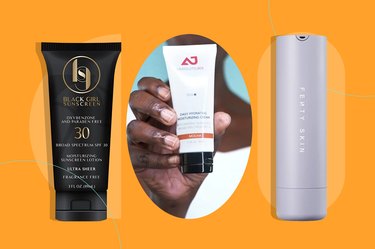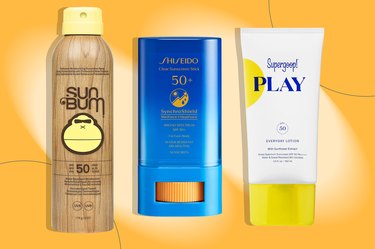
When summer comes, sunbathers flock to beaches, parks and poolsides to bask in the sun's rays. Sure, sunbathing can make you sweat, which most of us associate with burning calories. But you might be wondering: Does tanning burn calories or have any weight-loss benefits?
The answer is more than skin deep. Here, learn whether being in the sun burns calories (and whether you should even be tanning in the first place).
Video of the Day
Video of the Day
Warning
Prolonged sun exposure can lead to sunburn and skin cancer, per the American Cancer Society (ACS), so make sure to take protective measures (like wearing sunscreen or long-sleeved clothing) if you're spending time in the sun.
Does Sweating Burn Calories?
If you sweat while lying in the sun, you may think you're torching calories. But sweating itself does not burn calories or mean that you're losing weight (beyond any temporary fluctuations in water weight).
However, there are two things that do result from sweating while sunbathing — heat regulation and slowed metabolism.
1. Heat Regulation
Humans, like all mammals, are warm-blooded, meaning they regulate their own body temperature, according to Colorado State University. When your body senses it's in an environment that's too hot or cold, it takes measures to regulate its own temperature — namely, shivering in cold environments or sweating in warm ones.
Other physical responses to warm temperatures can include relaxing the muscles and lowering your metabolic rate (more on the latter up next), per Colorado State University and a June 2015 review in the Journal of Experimental Biology.
2. Slowed Metabolism
Metabolism is the process by which the body turns food into energy and supplies that energy to cells, according to the Mayo Clinic. This energy can either come from a meal or from reserves stored in the body as fat.
The amount of energy you need depends on your level of physical activity. But a body at rest still requires a minimum level of energy to maintain basic bodily functions — this is known as your basal metabolic rate, or BMR, per the Mayo Clinic.
When the body is warm and at rest, BMR drops, meaning your body needs fewer calories to keep itself functioning. And because tanning involves lying motionless in the sun or in a tanning bed, it requires very little energy. In other words, sitting in the sun doesn't burn many calories.
Sunbathing only burns calories in the general sense that doing anything at all burns calories. Your body even burns a small amount of calories by simply breathing, digesting food and sleeping, per Harvard Health Publishing.
But no, tanning itself doesn't burn extra calories.
Does Tanning Burn Fat?
While sitting in the sun doesn't burn calories, there is some scientific evidence that exposure to sunlight may help your body burn more fat. For example, November 2017 research in Scientific Reports concluded that the sun's blue light wavelengths help shrink white fat cells located just beneath the skin's surface.
The discovery was accidental. Researchers at the University of Alberta in Canada set out to help people with type 1 diabetes by attempting to genetically engineer fat cells to produce insulin when exposed to light. Along the way, they found sun exposure actually shrunk the lipid droplets in the fat cells under the skin and caused these cells to store less fat.
However, researchers also noted that more studies need to be done in this area, and that they don't yet know the intensity or duration of sunlight needed to activate this process.
The takeaway: The jury is still out on whether tanning burns fat, so don't swap your gym membership for a beach badge just yet.
Tip
Remember, prolonged sun exposure can lead to sunburn and skin cancer, per the ACS. Between that and the fact that tanning doesn't burn extra calories, your best bet for fat loss is to exercise regularly and eat a balanced diet, according to the Mayo Clinic.
Pros and Cons of Sunbathing
Even though you don't burn extra calories lying in the sun, there are some health benefits to safe, moderate sun exposure (read: don't skip the sunscreen).
For instance, sunlight helps your body make vitamin D, an important nutrient that helps the body absorb calcium and supports bone and joint health, per Harvard Health Publishing. Some research, like an October 2013 study in the International Journal of Epidemiology, has also linked vitamin D with better heart health.
There's also some evidence that safe amounts of sunlight may lower your risk for certain types of cancer: A February 2014 study in Environmental Health Perspectives found that it lowered breast cancer risk, while April 2015 research in the Journal of Steroid Biochemistry and Molecular Biology linked weak sunlight to a higher risk for pancreatic cancer.
However, prolonged exposure to the sun's ultraviolet rays (or the UV rays in a tanning bed) also carries health risks, including increased likelihood of sunburn and skin cancer.
To help lower this risk, the ACS recommends generously applying a broad-spectrum sunscreen (which protects against both UVA and UVB rays) with SPF of 30 or higher whenever you plan to be in the sun, and reapplying at least every two hours.
Sunbathing for long periods of time in particularly hot weather can result in heat stroke or dehydration. Watch out for symptoms of heat stroke, including rapid heartbeat, heavy sweating, dizziness, fainting and weakness, per the Mayo Clinic.
Other protective measures, like staying in the shade and wearing hats and long-sleeved clothing, can further defend your skin against potentially harmful rays.
- International Journal of Epidemiology: "Skin cancer as a marker of sun exposure associates with myocardial infarction, hip fracture and death from any cause"
- Scientific Reports: "Subcutaneous white adipocytes express a light sensitive signaling pathway mediated via a melanopsin/TRPC channel axis"
- Harvard Health: "6 Things You Should Know About Vitamin D"
- UC San Diego Health: "Pancreatic Cancer Risk Linked to Weak Sunlight"
- Environmental Health Perspectives: "Sun Exposure, Vitamin D Receptor Genetic Variants, and Risk of Breast Cancer in the Agricultural Health Study"
- American Cancer Society: "Don't Fry: Preventing Skin Cancer"
- Mayo Clinic: "Metabolism and weight loss: How you burn calories"
- Colorado State University: "Body Temperature"
- Journal of Experimental Biology: "The effects of temperature on aerobic metabolism: towards a mechanistic understanding of the responses of ectotherms to a changing environment"
- Mayo Clinic: "Weight-loss basics"
- Mayo Clinic: "Heatstroke"
- Harvard Health Publishing: "Burning Calories Without Exercise"


